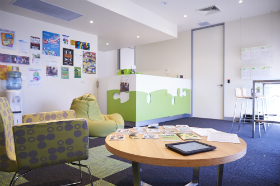
Two new papers published in the Medical Journal of Australia show that headspace is providing a valuable service for young people with mental ill-health that is improving their recovery outcomes.
The articles examined data from a large group of young people who attended a headspace service between 1 April 2013 and 31 March 2014 and found that over 80% of clients who contacted a headspace had their first appointment within two weeks and that their outcomes compare favourably with services overseas.
The articles are co-authored by Deb Rickwood, Kelly Mazzer, Nic Telford and Chris Tanti from headspace, Alex Parker, who manages the headspace Centre of Excellence based at Orygen, The National Centre of Excellence in Youth Mental Health, and Professor Patrick McGorry AO, Executive Director of Orygen.
Professor McGorry is encouraged by the positive data:
‘headspace is an internationally unique evidence-based reform in mental health care based on a decade long partnership between the Australian Government, the Australian community, clinical-academic leadership through Australia’s top universities and research centres, and the key national workforces in primary mental health care.’
‘These data provide encouraging evidence that headspace is an engaging and accessible entry point to the Australian health care system for young people and their families. We can now be confident that this national network of youth friendly one stop shops delivers access to effective and holistic primary care to those young people with moderate mental health problems.’
Despite the better access to safe and streamlined care for young people with mild to moderate mental health difficulties, the articles also confirm that there is still a gap in the system for those young people with more complex and persistent disorders.
‘headspace was not designed to treat these young people without more expert and intensive back up. Our data confirm that this substantial minority need more intensive and extended tenure of care linked in with the headspace portals,’ says Professor McGorry.
‘This is the next stage for development of Australia’s unique and innovative youth mental health reform and is a joint responsibility of Federal and State governments.’
The Australian Government has committed funding to the headspace platform to increase the number of centres to 100 by 2017. The platform has been recognised as a world-leading innovation and has been replicated in Ireland and Denmark.
Medical Journal of Australia articles
The services provided to young people through the headspace centres across Australia
Changes in psychological distress and psychosocial functioning in young people visiting headspace centres for mental health problems